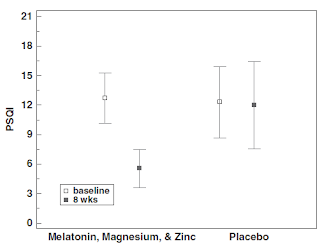Melatonin, Magnesium and Zinc for a Healthy Night of High Quality Sleep
Sleeping disorders are very common in our hectic society and sleeping pills are among the no.1 drugs (ab-)used by the general public. At least in a very restricted group of subjects, the combination of melatonin, magnesium and zinc has now proven a very viable and certainly more natural alternative to the highly advertised "chemical maces" of the big pharma companies.
In a double-blind, placebo-controlled clinical trial set in along-term care facility in Pavia, Italy, researchers from the University of Pavia (Rondanelli. 2011) found a combination of 5 mg melatonin, 225 mg magnesium, and 11.25 mg zinc, mixed with 100 g of pear pulp taken 1 hour before bedtime to be an effective treatment for primary insomnia in elderly subjects:
 |
| Figure 1: Effects of treatment of the primary end point. Mean Pittsburgh Sleep Quality Index (PSQI) (marker) are reported at baseline and at 8 weeks for the melatonin, magnesium, and zinc (left) and placebo (right) participants, together with their standard deviations (whiskers). (Figure 2 from Rondanelli. 2011) |
In a double-blind, placebo-controlled clinical trial set in along-term care facility in Pavia, Italy, researchers from the University of Pavia (Rondanelli. 2011) found a combination of 5 mg melatonin, 225 mg magnesium, and 11.25 mg zinc, mixed with 100 g of pear pulp taken 1 hour before bedtime to be an effective treatment for primary insomnia in elderly subjects:
The food supplement resulted in considerably better overall PSQI [Pittsburgh Sleep Quality Index] scores than placebo (difference between groups in change from baseline PSQI score=6.8; 95% confidence interval=5.4-8.3, P<.001). Moreover, the significant improvements in all four domains of the LSEQ [Leeds Sleep Evaluation Questionnaire] (ease of getting to sleep, P<.001; quality of sleep, P<.001; hangover on awakening from sleep, P=.005; alertness and behavioral integrity the following morning, P=.001), in SDQ [Short Insomnia Questionnaire] score (P<.001), in total sleep time (P<.001), and in SF-36 physical score (P=.006) suggest that treatment had a beneficial effect on the restorative value of sleep.To summarize the results, the patients receiving the treatment for 8 weeks, slept longer, slept deeper, found it easier to get up in the morning and were overall more alert than those receiving placebo treatment. While it would certainly be necessary to verify these beneficial effects in younger subjects, it appears that the days of ZMA could well be over, with MMZ, i.e. Melatonin-Magnesium-Zinc being the new buzz-word of the industry.


